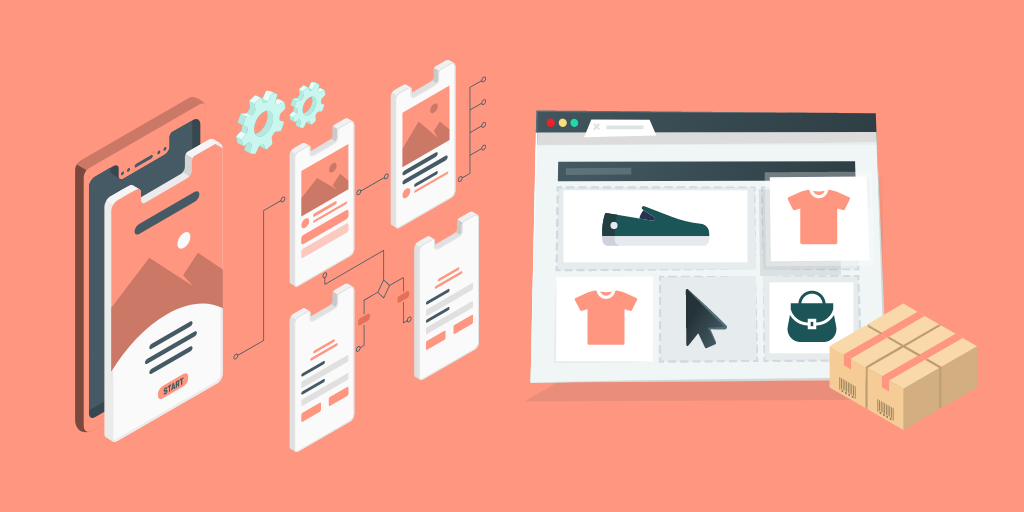In 2021, all the signs point to B2B eCommerce as the future of sales for B2Bs. Most of the customers aren’t planning to return to in-person sales even this year. That’s fine for B2B buyers as they prefer to research, analyze, and order in a self-service, digital environment.
On the other hand, when more and more distributors, wholesalers and manufacturers are exploring ways to move to the digital market, many are still skeptical about it. B2B brands worry about the success of their digital initiatives.
Many of them harbor fears which have still held them back. They are about the hefty investments that go into this whole digitization process. They think making changes to their existing processes may alienate their employees.
Along with these fears, they are currently facing the uncertainties brought by COVID-19 pandemic.
However, a Minimum Viable Product approach is capable of addressing many of these fears. In the software development landscape, implementing an MVP approach helps in building the absolute minimum and extracting the most value out of the exercise instead of delivering a complete product.
Techopedia defines Minimum Viable Product as,
“A minimum viable product (MVP) is a development technique in which a new product or website is developed with sufficient features to satisfy early adopters. The final, complete set of features is only designed and developed after considering feedback from the product’s initial users.”
This is a concept that is introduced by Eric Ries – a writer and consultant on startups.
In the B2B eCommerce landscape, an MVP strategy plays a crucial role because adopting and implementing eCommerce on a B2B model can have major impacts on every component of the business.
We believe it’s an absolutely transformational process that impacts operations, marketing, sales, customer experience, and customer support. The MVP strategy not only impacts these areas of a business but provides feedback that is crucial for the success of an eCommerce business.
Unlike B2C eCommerce, the B2B eCommerce processes vary by company to company. When you’re all set for the first soft launch, implementing an MVP strategy can facilitate you to evaluate the potency and value of your digital efforts.
Adding eCommerce to your B2B business is pretty much more than just adding a shopping cart feature to your company’s site. It’s an optimal way to improve business efficiency and provides flexibility required to adapt the changing business trends.
MVP is simply a digital transformation with all the ability to future proof marketing, sales, and operations. Adopting and implementing an MVP strategy on your B2B eCommerce business will definitely put your project on the path of ultimate success.
We believe digital transformation is challenging so using an MVP approach to translate lofty ideas into small components makes your business goals more achievable. Using an MVP approach will help you in turning your business goals into reality by helping you learn, evaluate, and deliver how these goals impact your company and how they can be achieved in the shortest time possible.
B2B eCommerce and MVP goes hand in hand
Today B2B buyers prefer to access the mountains of information first. They are quite rigid in nature and accustomed to purchasing and engaging on their own terms and conditions.
Apart from the sudden rise in customer expectations, the product libraries are growing massively thus the sales professionals have to deal with more complex sales cycles.
Therefore, when the digital market has become so competitive, launching a brand new eCommerce can be the riskiest business move especially if you’re entering in the digital selling channel for the first time.

Setting-up a fully functional B2B eCommerce store requires extensive research, planning, resources, time, and effort. However, adopting the MVP strategy in such a scenario is more beneficial and cost-effective.
With a B2B eCommerce MVP approach, you can first test out the core functions, evaluate and analyze its reception, collect user feedback and test it, and then decide whether you should invest more effort in the idea or not.
Based on the obtained results, you may choose to double down on the initial idea or pivot to a brand new and more propitious one, or start fresh.
It may seem a counter-productive, time-consuming, and costly idea. But the reality is quite opposite. Think about digitizing your B2B business in this way:
You can spend $600,00 and two year of work on B2B eCommerce website, however in the end you discover that is not capable of addressing your customers’ needs and demands.By comparison an MVP approach might cost you $300,00 and 6 months of work to make sure that you’re on the right track.
Why do you need an MVP approach to B2B eCommerce?
An eCommerce MVP is certainly the closest thing to launching your online portal idea into the real business world. The experience of building an MVP will help you immensely to reform your team, optimize your resources, gain customer insights to create a better product.
B2B businesses these days prefer to go with an MVP approach for their digital commerce projects for various reasons. Some of them are:
Customer-centricity
Customers’ needs and demands are evolving rapidly and their expectations are becoming more complex by every passing day. An MVP approach keeps an eCommerce strategy aligned with the audience.

- Validate ideas – An MVP approach ensures that you’re actually providing the experience that your customers want. Drawing conclusions earlier only wastes your resources and time. As we know, not every idea makes it. Therefore, it’s the cheapest and fastest approach that you can use to test the validity of all your assumptions.
- Act on customer feedback – Collecting feedback of users is essential as it provides the insights that are crucial to keep stakeholders and customers needs and development in alignment. An MVP directs you to develop a demanded eCommerce experience while building products without any unwanted functionalities and features.
- Following market trends – Today’s world is full of uncertainties so is the market which has become more unpredictable than before. Long planning and development cycles risk crippling large eCommerce projects. However, an MVP reduces the opportunity cost losses.
Faster deployment time
Since eCommerce MVP primarily focuses on a few major features and prioritizes quick turnaround times, they rarely take longer than a few months. This gets your online portal up and running faster.
- Quicker ROI – An MVP helps in speeding up the user onboarding process. The sooner your MVp is available to your customers, the sooner they will make a purchase. That quickly puts your business on the road to ROI.
- Reduced implementation time – As MPV progresses, the features and ideas that don’t validate are dumped. This will potentially shorten the implementation time.
- Faster marketing – An MVP offers you a first-mover advantage. You can start building your online presence , recognition, and gain a competitive edge in the market.
Cost-effective
With a clear focus on narrow goals, you can greatly reduce the resources that are necessary to achieve them. An MVP helps you in using all your resources wisely.
- Reduces risk – The iterative, whole-company , and customer-centric approach to development identifies risks at early stages and minimizes their impact.
- Cost optimization – Greater visibility during the project scope and feature scoring stages maintains focus which translates to lower development and implementation costs.
- Variety of options – When you’re building your MVP on a solid platform, you grow to meet your business needs. Your MVP is basically a proven option upon which you can easily add new features.
Final Thoughts
The MVP approach is not just the most beneficial and cost-effective way to create your B2B eCommerce presence, but it’s the right way to do so. An MVP approach to B2B eCommerce helps you to identify the key needs of your buyers and build a solution that perfectly fulfills your business needs.
At the same time, a Minimum Viable Product approach is a consistent source of feedback and learning. It allows you to adapt to changing project requirements and implement all the required features and capabilities of your eCommerce solution.
If you’re a WooCommerce B2B store owner and want to enhance your productivity, then B2BWoo is the best option for you. It’s a one-stop-shop for your every WooCommerce B2B eCommerce solutions.
Read Also
- Which B2B eCommerce Platform To Use For Your B2B eCommerce Site
- 5 Reasons Behind the Shopping Cart Abandonment and Tips on Preventing Them
- B2B Ecommerce Facts in 2021 Every B2B Leader Should Know
- What Will Ecommerce Look Like in 2021
- 10 B2B eCommerce Advantages To Capture Before Your Competition
- Five Most Common B2B Ecommerce Mistakes Owners Make When Starting Out
- 6 Biggest Content Marketing Trends That Will Dominate 2021
- Wholesale Distribution Trends For 2021
